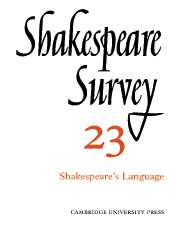Book contents
- Frontmatter
- Shakespeare and the Tune of the Time
- Some Functions of Shakespearian Word-formation
- Guide-lines for Interpreting the Uses of the Suffix ‘-ed’ in Shakespeare’s English
- Shakespeare’s Use of Colloquial Language
- Words, Action, and Artistic Economy
- ‘Antony and Cleopatra’: the Limits of Mythology
- Shakespeare’s ‘War with Time’: the Sonnets and ‘Richard II’
- Shakespeare and Christian Doctrine: Some Qualifications
- Shakespeare’s Poets
- The Text of Coleridge’s 1811–12 Shakespeare Lectures
- Shakespeare Studies in German: 1959–68
- A Neglected Jones/Webb Theatre Project: ‘Barber-Surgeons’ Hall Writ Large
- Interpretation or Experience? Shakespeare at Stratford
- 1 Critical Studies
- 2 Shakespeare’s Life, Times, and Stage
- 3 Textual Studies
- Index
- Plate section
Shakespeare Studies in German: 1959–68
Published online by Cambridge University Press: 28 March 2007
- Frontmatter
- Shakespeare and the Tune of the Time
- Some Functions of Shakespearian Word-formation
- Guide-lines for Interpreting the Uses of the Suffix ‘-ed’ in Shakespeare’s English
- Shakespeare’s Use of Colloquial Language
- Words, Action, and Artistic Economy
- ‘Antony and Cleopatra’: the Limits of Mythology
- Shakespeare’s ‘War with Time’: the Sonnets and ‘Richard II’
- Shakespeare and Christian Doctrine: Some Qualifications
- Shakespeare’s Poets
- The Text of Coleridge’s 1811–12 Shakespeare Lectures
- Shakespeare Studies in German: 1959–68
- A Neglected Jones/Webb Theatre Project: ‘Barber-Surgeons’ Hall Writ Large
- Interpretation or Experience? Shakespeare at Stratford
- 1 Critical Studies
- 2 Shakespeare’s Life, Times, and Stage
- 3 Textual Studies
- Index
- Plate section
Summary
For practical rather than for nationalistic reasons most German and many Swiss publications on Shakespeare continue to be in German. Writings on the most popular dramatist on the German stage may legitimately hope for a response by German readers; and the more their authors adopt critical methods, the more they tend to rely on their command of the nuances of their native language. On the other hand an increasing unawareness of these studies in the English-speaking world has become evident, and German Shakespearians are sometimes overcome by a feeling of isolation, or, at best, of the onesidedness of their contribution to the critical dialogue. Naturally enough, they take due account of what has been done in English and are at times confident—rightly or wrongly—that they have hit upon a new answer to a problem, or a modification to an opinion current in Shakespeare criticism generally. But if they remain unheeded on the other side of the Channel (or the Atlantic), much independent grappling with parallel problems is, as the following pages may well suggest, the inevitable result. The present survey of German Shakespeare studies published roughly between 1959 and 1968 can hardly expect to remedy this state of affairs. It merely hopes to draw attention to some general trends and to some individual achievements and is therefore intended to be informative rather than critical. In order to avoid an accumulation of titles it covers independent publications only and excludes articles.
- Type
- Chapter
- Information
- Shakespeare Survey , pp. 113 - 124Publisher: Cambridge University PressPrint publication year: 1970

